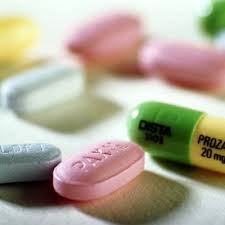February 8th, 2011 by GarySchwitzer in News, Research
No Comments »

 Reuters Health reports that more than a quarter of Americans taking antidepressants have never been diagnosed with any of the conditions the drugs are typically used to treat, according to new research published in the Journal of Clinical Psychiatry. An excerpt:
Reuters Health reports that more than a quarter of Americans taking antidepressants have never been diagnosed with any of the conditions the drugs are typically used to treat, according to new research published in the Journal of Clinical Psychiatry. An excerpt:
“We cannot be sure that the risks and side effects of antidepressants are worth the benefit of taking them for people who do not meet criteria for major depression,” said Jina Pagura, a psychologist and currently a medical student at the University of Manitoba in Canada, who worked on the study.
“These individuals are likely approaching their physicians with concerns that may be related to depression, and could include symptoms like trouble sleeping, poor mood, difficulties in relationships, etc.,” she added in an e-mail to Reuters Health. “Although an antidepressant might help with these issues, the problems may also go away on their own with time, or might be more amenable to counseling or psychotherapy.”
*This blog post was originally published at Gary Schwitzer's HealthNewsReview Blog*
December 10th, 2010 by AnnMacDonald in Better Health Network, Health Tips, News, Research
1 Comment »

Only one-third of people with major depression achieve remission after trying one antidepressant. When the first medication doesn’t adequately relieve symptoms, next step options include taking a new drug along with the first, or switching to another drug. With time and persistence, nearly seven in 10 adults with major depression eventually find a treatment that works.
Of course, that also means that the remaining one-third of people with major depression cannot achieve remission even after trying multiple options. Experts are hunting for ways to understand the cause of persistent symptoms. In recent years, one theory in particular has gained traction: that many people with hard-to-treat major depression actually suffer from bipolar disorder. However, a paper published online this week in the Archives of General Psychiatry suggests otherwise — and the findings provide new insights into the nature of treatment-resistant depression. Read more »
*This blog post was originally published at Harvard Health Blog*
April 1st, 2010 by RamonaBatesMD in Better Health Network, Health Tips, News, Opinion, Research
1 Comment »

I have written two posts in the past on proper disposal of unused medications, and I have always been mindful of the medicines as a source of environmental water pollution. This past week the American Chemical Society reminded (head-slapped me) that topical medications are a source of environmental water pollution from their active pharmaceutical ingredients (APIs). Yes, the simple act of bathing washes hormones, antibiotics, and other pharmaceuticals down the drain into the water supply.
Ilene Ruhoy, M.D., Ph.D. and colleague Christian Daughton, Ph.D. looked at potential alternative routes for the entry into the environment by way of bathing, showering, and laundering. These routes may be important for certain APIs found in medications that are applied topically to the skin — creams, lotions, ointments, gels, and skin patches. These APIs include steroids (such as cortisone and testosterone), acne medicine, antimicrobials, narcotics, and other substances. Read more »
*This blog post was originally published at Suture for a Living*
Reuters Health reports that more than a quarter of Americans taking antidepressants have never been diagnosed with any of the conditions the drugs are typically used to treat, according to new research published in the Journal of Clinical Psychiatry. An excerpt:













